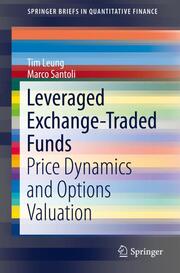Detailansicht
Leveraged Exchange-Traded Funds
Price Dynamics and Options Valuation, SpringerBriefs in Quantitative Finance
ISBN/EAN: 9783319290928
Umbreit-Nr.: 8911159
Sprache:
Englisch
Umfang: x, 97 S., 32 farbige Illustr., 97 p. 32 illus. in
Format in cm:
Einband:
kartoniertes Buch
Erschienen am 08.03.2016
Auflage: 1/2016
- Zusatztext
- This book provides an analysis, under both discrete-time and continuous-time frameworks, on the price dynamics of leveraged exchange-traded funds (LETFs), with emphasis on the roles of leverage ratio, realized volatility, investment horizon, and tracking errors. This study provides new insights on the risks associated with LETFs. It also leads to the discussion of new risk management concepts, such as admissible leverage ratios and admissible risk horizon, as well as the mathematical and empirical analyses of several trading strategies, including static portfolios, pairs trading, and stop-loss strategies involving ETFs and LETFs. The final part of the book addresses the pricing of options written on LETFs. Since different LETFs are designed to track the same reference index, these funds and their associated options share very similar sources of randomness. The authors provide a no-arbitrage pricing approach that consistently value options on LETFs with different leverage ratios with stochastic volatility and jumps in the reference index. Their results are useful for market making of these options, and for identifying price discrepancies across the LETF options markets. As the market of leveraged exchange-traded products become a sizeable connected part of the financial market, it is crucial to better understand its feedback effect and broader market impact. This is important not only for individual and institutional investors, but also for regulators.
- Kurztext
- Important timely topicIncludes a detailed discussion on how to implement and regenerate findings within the bookProvides a systematic study of a number of mathematical problems associated with exchange-traded funds (ETFs) and their related financial products.Text has been used in lectures at Columbia UniversityIncludes supplementary material: sn.pub/extras
- Autorenportrait
- Tim Leung is a tenure-track Assistant Professor at Columbia University's Industrial Engineering and Operations Research (IEOR) Department. He is also an affiliated faculty member of the Center for Financial Engineering, and Data Sciences Institute at Columbia. He received a PhD in Operations Research & Financial Engineering (ORFE) from Princeton University. Dr. Leung's research areas are Financial Engineering and Optimal Stochastic Control, with a focus on the valuation of financial derivatives, and associated risk management and trading strategies. He has written extensively on exchange-traded funds (ETFs). His research has been funded by the National Science Foundation (NSF). He has published in various Financial Mathematics journals, including Mathematical Finance, Finance and Stochastics, SIAM Journal on Financial Mathematics, and Quantitative Finance. He is also an officer of the SIAM SIAG on Financial Mathematics and Engineering, and the INFORMS Finance Section.
